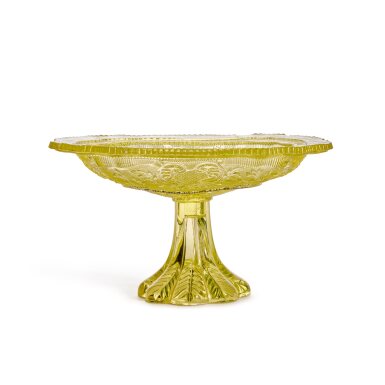Property from the Collection of Dr. Larry McCallister
Property from the Collection of Dr. Larry McCallister

A Large Princess Feather-Pattern Canary-Yellow Sandwich Glass Compote, Circa 1835-40
Auction Closed
September 22, 07:47 PM GMT
Estimate
25,000 - 35,000 USD
Lot Details
Description
A Large Princess Feather-Pattern Canary-Yellow Sandwich Glass Compote
Circa 1835-40
Height 5 15/16 in. by Width 10 3/4 in. by Depth 9 1/8 in.
As demand for decorative glass expanded during the second quarter of the 19th century, glass houses in New England and in the Midwest shifted away from imitating the expensive cut glass objects from abroad and began producing pressed glass with a "lacy" or stippled background, which inherently lend brilliance to glass that often contained impurities.
The Boston and Sandwich Glass Company was one of the leading manufacturers of glass in America, and the discovery of a related fragment to this "Princess-Feather" pattern compote at an archaeological dig at the historic Sandwich factory is at the basis of its attribution. The top dish of the compote, with its thinner, intricate lacy design and undulating border was pressed separately from the thicker flared-foot, and the two were later joined by a wafer at the top of the stem. While most lacy compotes were made of colorless glass, this rare canary yellow compote was one of five other known colors including wisteria, deep amethyst, sapphire blue and electric blue featured in this form.
A nearly identical compote was featured in Feld, Elizabeth and Stuart P. Feld, Of the Newest Fashion: Masterpieces of American Neo-Classical Decorative Arts, An Exhibition Commemorating the Fiftieth Anniversary of Hirshl & Adler Galleries, (New York: Hirschl & Adler, 2002), p. 87, cat. 67. Another similar "Princess Feather" pattern glass compote attributed to the Boston and Sandwich Glass Company is in the collection of the Art Institute Chicago, acc. no. 1933.1323, formerly in the collection of Arthur Heun, and was published in Judith A. Barter et al., American Arts at The Art Institute of Chicago: From Colonial Times to World War I, (Chicago: The Art Institute of Chicago, 1998),197–199, no. 90.
